|
10/28/2017 Art & Text by Amy Bassin & Mark BlickleyBio: New York fine arts photographer Amy Bassin and writer Mark Blickley work together on text based art collaborations and videos. Their text based art collaboration, Dream Streams, was featured as an art installation at the 5th Annual NYC Poetry Festival and and excerpts were widely published in the Columbia Journal of Literature and Art and many other journals and anthologies. Their video, Speaking In Bootongue, was recently selected for the London Experimental Film Festival. They just published a text based art chapbook,'Weathered Reports: Trump Surrogate Quotes From the Underground' (Moria Books, Chicago). The publisher sent their resistance book to the White House and members of Congress. 10/28/2017 Poetry by William AtkinsPURPLE TOOTH Once Tooth had worked through each mineral, splitting atom and ant from ant and posterior, he saw the earthworm and split that in two, too. He poisoned the dirt for its comrades to eat and split the grass in half to deafen them. Some wretched torture that was. Tooth snapped veins and arteries from spiders’ webs and wove blankets for them to cover the pain with because, boy, it was getting cold ‘round then. He cut the wire on the stove so that families would starve If they didn’t get with the old ways. Things were so much simpler those days… Tooth thinks of his Gother sometimes and cries but no one see’s. Not the bees, not the birds nor the flies. It wasn’t easy since they fell apart. But milk teeth always were a pain. Tooth saw the baby in its pram, stifled a tear. He angered. He started to charge with a spear on his head but a voice stopped him, said “Not today, Sonny Jim… It’s nowhere NEAR harvest time. Don’t cut off a smile just to scar it.” So Tooth dug his root into the earth, and soaked back up his poison to use for another time, hoping it was a good year to barrel age. Tooth's first dance There’s the ledge. It seems that Tooth has been poking out his head from many angles here. He’s about ready. The music isn’t right though. It’s too tame and slow, like dinner jazz. How is anybody meant to swing? Do they know this?? Tooth has had his eye on those trousers, on that top. There’s an unsure smile above it, like a timid dog that approaches hand for the first time. Waits for tongue to complete the sunset that was so clouded over before that no dreams mattered. Tooth thinks its funny how so little changes. A slow song… good. Maybe the chance. Tooth yearns for throbbing vein, he aches for skin. He’s quiet though. He waits, he watches with kingfisher stealth. Maybe one day he’ll find a partner or magician to change the way he thinks. That’s what Tooth hopes. Tooth can’t change though. He’s a sharp wit and harsh critic. A kind soul, misunderstood. Strange-hearted. That’s what Tooth thinks. He sees Lip and asks for a dance. Lip dances better than Tooth. Tooth, however, uses one half of his wit to cut through Lip’s dress and another to cut through her skin. He sees Lip in rags. The whole room is in an uproar, every molecule, a vocal chord. An echo round a mouth in distraught confusion. Red is on the floor, all around Lip who lies in shock, an island in the Red Sea. Anyone there who is Eye or is Lid is close to drowning. Tooth is back at the ledge with a glass of wine, now. He turns red. No one points the finger though. Tooth was Tooth and Lip was Lip and that was it, and the music just wasn’t right for a night like this. Tooth: A Decision Tooth was handed down a scale. It was bronze with two undulating discs. Some strange dance it gave. Onto one side he placed a fish, dead and gutted with its eye turned out toward the ghost of thought. On the other he placed a bird, feathers reddened in patches neck loping over the edge. Around its beak hung the final echo of its cry. Such equality in death, thought Tooth. When living, this bird used wings to soar and this fish used gills to breathe yet no sea nor air could house the other. Tooth saw that there were three worlds. He struck a match and burnt this impossible image immediately. Placing half the ashes on each creature he incinerated their carcasses as one. As they flew across fields and woodland they fell onto a stream that sat as a scar across the green land, the sky was grey with fire. From a safe distance Tooth watched as a blue streak dropped into the stream & shot back up with its prey. Some kind of monster sewing together the below and above just to make it all seem the same. Tooth saw the monster and saw it was too late. He was on the scale now, rocking like a boat. On the other side was placed a fingernail. Such inequality in life, thought Tooth. The useless excesses put up on trial whilst hair still grows and eyes still shine. Tooth and Nail were left there for eternity, judging nothing else but rot.  Bio: William Atkins is 26 years old and lives in London. He has been writing poetry for about 3 years now and aims only to better his work. He cares a lot for reality and its occasional surrealism, especially in Nature
Photo: Tom Reese
Paula Boggs has worn more than a few hats in her lifetime, a musician and songwriter logging in a decade now as the front-woman for the Paula Boggs band, a lawyer, a former federal prosecutor, and an Army Airborne veteran. Up until this year, when she and other members decided to resign, she was also a longstanding member of the President's Committee on the Arts and Humanities, originally appointed by President Obama. Boggs has spent a lifetime in service in various fields and capacities, but it is with music that one feels the soul speak through those life chapters. As Paula puts it: "Music is our best shot at “hearing” each other." On the bands new album Elixir: The Soulgrass Sessions, the call to connection, action and human understanding is poignantly at work through each of the songs, and if ever there were a time when such music was necessary, it is now. "Every day is a canvas" and we must use our brush well, if the surface happens to be our world what would you want to see reflected back at you, truth, beauty, love, understanding? These are the themes threading through Boggs' vast musical book, the life chapters lead one to a present not just born of experience, but of a lot of hope too; "I’ve now lived through enough freakout moments to know the sun will rise the next day," Paula says, adding: "It’ll rise for you too." AHC: What has this journey in music, so far, been like for you, the highs and the lows, and what life lessons do you feel you've picked up along the way? Paula: My music journey has life chapters. Exposure to music came early through the rhythm and blues I heard at home, to the Catholic folk music at school and my dad’s church, to the more solemn traditional minor chord music also at St. Joseph’s, to the gospel music of my mom’s African Methodist Episcopal faith. Though I started playing piano at age 6, by 10 I’d found a passion for guitar and songwriting. During my teen years in Europe where my mom taught, I continued to write music, performing in choirs, talent show or a music event, but I also got exposure to more classical music, jazz, European folk music, Armed Forces Network top 40 music and euro-rock. Returning to the U.S. for college exposed me to new and diverse music, including Elvis Costello and Bruce Springsteen — and living in Berkeley, CA after that exposed me to more. Throughout this time I played in and sometimes wrote music for folk mass and found my way to an open mic from time to time until I stopped — partly due to leaving the Catholic Church and also because a law career consumed more of me year over year. Though I didn’t consider it “low” as I was going through it, not playing or writing music for 15 years was my music “low” and I’m living the “high” right now. I’ve never felt more free to write and share music than right now. AHC: What first drew you to music and what was your early musical environment like growing up? Were there pivotal songs for you then that just floored you the moment you heard them? Paula: I don’t remember a time without music. My dad in particular was very musical. He played sax and was a cantor. Jerry Butler’s “Moon River” is the first song I recall and I was likely 2 or 3 when I first heard it. The nuns at my Catholic school were smitten by Bob Dylan, Simon & Garfunkel, Judy Collins, Peter, Paul & Mary, etc. so I was hearing that from first grade on along with the folk mass music of the day. Simon & Garfunkel’s “The Sounds of Silence” floored me the first time I heard it — the chord progressions, it’s poetry, it’s message, the weaving of their voices — and 50 years later, Disturbed floored me again by covering it. AHC: What do you think makes for a good song, as you're writing and composing, is there a sudden moment when you know you've found the right mix, that perfect angle of light, so to speak? Paula: A “good” song communicates something impactful to the listener. On our latest album, “Elixir, The Soulgrass Sessions” we have songs that tell traditional stories, those that convey messages that can be received more than one way, songs that through words, melody and arrangement set a mood or evoke a visceral state and those that tell a story solely through instruments. For me, writing inspiration comes from a variety of places — a newspaper article, a triggering personal life event or empathy for another’s, something random while walking, people-watching at Starbucks; it’s all fair game. AHC: Do you consider music to be a type of healing art, a slightly imperfect vehicle through which to translate a feeling, states of rupture/rapture, hope lost and regained? Does the writing and creating of the song save you in the kinds of ways that it saves us, the listener? Paula: I don’t think music always heals. Some music irritates or agitates me. It makes me uncomfortable. Some music I can only listen to at certain times of day; it’s almost like consuming too much caffeine. The music I write can be frustrating when I’m stuck but mostly it’s healing for me. It’s sometimes the only way I can express something. It becomes my translator. It can take on friend-like qualities. My number one goal in writing is to be authentic. That comes before worrying about whether anyone, even me, likes it. We humans sometimes hear through song what we fail to hear through spoken or written word. Music is primal. We all have a relationship with it and so in that way, it is truly a universal language. AHC: What are your fondest musical memories? In your house? In your neighborhood or town? On-tour, on-the-road? Paula: There are many but here are a few. My fondest music memories as a little kid are of my siblings and I performing the Staples Singers “O Happy Day” to family friends and others or me driving to school with my dad and hearing Donovan’s “Mellow Yellow” or The New Vaudeville Band’s “Winchester Cathedral” on the radio and knowing all the words. In 9th grade I spent a week in a German castle with other American kids, Germans, Canadians and Brits. At the beginning of the week none of us knew the music but by Friday night we gave a recital of works like Handel’s Messiah and Carl Orff’s Carmina Burana. In 9th grade I was chosen by the senior class to sing and play Dylan’s “The Times They are a Changing” at their graduation ceremony and I sang and played an original song at my own. While living in Berkeley, I attended The Rolling Stones “Tattoo You” concert in Candlestick Park. Hands down, the most amazing experience I’ve had as a touring musician happened in Charleston, SC last June when we premiered our song “Benediction” with the Mother Emanuel AME Choir on the second anniversary of their church massacre. AHC: You give credence and are dedicated to the fact that the political is personal and that we all bear responsibility for the fabric of our world, our country, our town. As you sing in Sleepwalking, "Every day is a canvas... grab that brush and use it well," do you find music uniquely situated to carry a message that is able to soar beyond our usual defenses and plant seeds, hopefully, of a more open, responsive and sustainable world? Paula: Music is our best shot at “hearing” each other. Paul Simon wrote about this in “The Sounds of Silence.” When Paula Boggs Band sings “Sleepwalking” my hope is our music uplifts while also sending the message “all of us must have skin in this game” to make it better. AHC: Your new record, Elixir: The Soulgrass Sessions, is an incredible mix of themes that I think is unified by love; protest, faith, the struggles and arc of a life, seem tied in to an ineradicable sense of connection that must be rekindled in our age of rapid disconnection and fraying. "I don't have answers and I can't pretend, but I know that we need each other just to mend and reset how the game is played" as you sing in "Peel the Charade," is an important reminder to the fact that no one really goes it alone. Do you find love, universal perhaps because first born on a smaller scale, to be one of the guiding lights on this record? What were your inspirations going into this latest record and your overall feelings about its final form? Paula: I think love is universal and we need to find paths to empathize with each other within the United States and beyond. For Earth to survive I don’t think we have the luxury of doing something different. Life has taken me many places and my journey teaches me we are more alike than different. There are folks I know who see the world differently in myriad ways. One of them, from high school, is on the polar opposite end of the political spectrum, but he drove 4 hours to see us play in Philadelphia —someone I reconnected with on Facebook but had not seen in a generation plus. We are different races; he calls me his “sister.” I don’t often “agree” with him but I “see” him. The music I wrote, the song “Two Daughters” our banjo player/guitarist Mark Chinen wrote and our decision to cover Bon Iver’s “Holocene” were inspired by deep “love,” concern and “wonder.” We wanted to create something bigger than ourselves, something authentic, something enduring, something artistically excellent. With the help of producer/engineer Trina Shoemaker and Robert Lang Studios each of us dug deep within ourselves to make this record. I’ll never forget Trina asking me “where did you go?” after she heard me sing the second verse in “Holocene.” Time will tell whether this work endures and the listener will judge its excellence. It is though bigger than the sum of our parts and it is authentic. AHC: Do you have any words of advice or encouragement for other musicians and singer-songwriters out there who are just starting out and trying to find their voice and their way in this world? What are the kinds of things that you tell yourself when you begin to have doubts or are struggling with the creative process? Or what kinds of things have others told you that have helped push you past moments of self doubt/creative blocks? Paula: A lifetime ago, jumping out of perfectly well-functioning planes, I learned it’s OK to be afraid. Sometimes fear is extremely rational. What sometimes separates those paralyzed by fear from others is what we do with it. Every day I wake up not knowing if there’s another song in me. Song ideas come to me randomly; there’s no method to it. Sometimes it’s melody first and sometimes it’s prose. I am very fortunate to have a life partner who believes in me unflinchingly when others don’t. It’s a gift to have played with Sandy Greenbaum, Mark Chinen and Tor Dietrichson 10 years. That stability fuels the creative process. It’s hard to make a living in music and I’ve learned to augment what I earn in music with other jobs. Though that mix is different for each member of Paula Boggs Band, we all do it. Things go wrong. A string breaks. Amps don’t work. The sound guy doesn’t show up. A member of the band bails. I’ve now lived through enough freakout moments to know the sun will rise the next day. It’ll rise for you too. For more visit www.paulaboggsband.net/ 10/27/2017 Walker's Requiem by Craig RossWalker's Requiem I could see myself in the dark mahogany coffin. How I had gotten there and why was something I couldn't remember. I could hear the hum of an organ playing softly in the background, as mourners began filling the pews of the small church. Most of the faces I didn't recognize, but there were a few mugs I was happy to see, homeboys from the old neighborhood-Big J.T., Lowdown, Spoony, and Spoony's little brother, Klepto, who, at the ripe old age of ten, was already a professional thief. I thought it was strange that they were wearing white dinner jackets and carrying serving plates. Then again, these were guys who'd wake up in the morning and smoke weed for breakfast. They probably thought there were going to be some eats after the funeral. I didn't blame them; these things can be pretty boring. I saw my family seated in the front row. My lawyer, with his secretary, Dora, was sitting behind them. My mother, who never dreamed she would outlive any of her children, looked on, stricken. I felt a pang of guilt. The sound of the organ began to fade and the faint hush of whispers among the mourners slowly subsided. Whack! "Now put that back!" I heard Spoony say, as he popped Klepto upside the head. Then they all began to stare hypnotically at the dark-robed figure standing ominously behind the wooden podium. His face was obscured by a large hood, and his hands were gloved. Man, this guy is straight outta the comic books, I thought. When he spoke, his voice seemed to resonate off the walls of the church, sending icy chills through my skin like an arctic breeze. "Let us all rejoice in the holy offering!" he bellowed Offering? What offering? I thought. "Let us give thanks to the blessed one," he commanded, as everyone in the church began nodding their heads in unison and shouting, "Thank you, Lord! Thank you, Lord!" Whooooaaaa! Back up, mister! What fucking offering? This is my goddamn funeral, not a- "We shall partake of the sacrifice!" he thundered on, followed by another joyous chorus of "That's right, Lord. Thank you, Lord!" Hey! What the hell is going on here? I tried to scream, but couldn't make a sound. He then beckoned to everyone to gather around the casket, and I could feel them pressing and pushing up against the sides, peering in at my lifeless body, lovingly . . . almost hungrily. Panic set in, and I tried to get up and run, but I couldn't move. Aw, c'mon-let me outta here, I pleaded. I ain't no offering. I felt hands caressing and poking my body. Then I saw my little sister and Klepto licking their lips and my lawyer's secretary wiping off her silverware. The dark figure walked to the head of the casket and pulled back his hood. His face was hideous: there was no skin, just bone and pieces of rotting flesh. His mouth was twisted and mangled as he grinned, displaying rows of sharklike teeth, and his eyes were only gaping holes filled with maggots. I frantically looked around and saw everyone changing into grotesque and disfigured creatures. My mother was barely recognizable as she grabbed me by the throat with a clawed hand and began to lift me straight from the coffin. Filled with the horror of what was about to happen, I tried to close my mind to the gruesome scene. . . . I couldn't. "Now! Let us all feast!" the robed thing said, as he snapped off one of my arms like a chicken wing. Noooooo! I screamed in my mind, just as the thing that used to be my little sister dislodged one of my eyeballs from its socket with her easybake oven fork and greedily gobbled it down. My eyes flew open and I quickly sat up in the bunk to survey the small cell. Everything was still. "Damn!" I whispered to myself. "You gotta get a grip, man." Dreaming is one thing, but this shit is ridiculous. Some would claim this was guilt eating away at my conscience . . . fuck them! I bet that prison shrink would have a field day analyzing my dream. Fuck him, too. I looked out the small window directly in front of my cell. It was dark outside, making things seem almost peaceful. But that was an illusion. There was nothing peaceful about prison, nothing serene about death row, and at that very moment certain preparations were being carried out that placed me at the center of it all. My name is Nathan Cole Walker; Nat Cole for short, a nickname my grandmother gave me on account of her fondness for the singer Nat King Cole. Personally, I can't hit a note and rap music is my thing. I must admit, I did have a smooth style that infatuated the young ladies. But that was eons ago and a helluva lot has changed since those days. In less than twenty-four hours it will be my twenty-fifth birthday, but there will be no celebrating, no party, no happy nothin'. Because I'm not gonna live to see it. Six years ago, I was sentenced to death. The whys don't matter now, and the particulars aren't important. Today I have run out of time, destiny has come kicking at my door, and I am scheduled to be executed promptly at eleven thirty Wednesday night. It is now Wednesday morning... my last day on Earth. I tried to shake the dream from my head, before beginning my routine of pacing the six-by-ten cell. It's a mode of controlling the rage of the half-man, half-animals we've become. A silent way of expressing our malediction at being caged. It is never escape-respite, maybe-but never escape. "Anything wrong, Walker?" the guard who was posted outside my cell asked. He had been watching me from the moment I woke up, jotting down his observations on paper. "Naw, nothin' I can't deal with," I shot back in disgust. "What time is it?" I asked the guard. He glanced up from the Playboy he had stashed between the pages of a National Geographic, rubbed his eyes, and looked at his watch. "It's almost six thirty." He yawned. "Just about time for me to be gettin' outta here," he added, with apparent relief. Six thirty was the shift change; another guard would be taking his place for second watch in a few minutes. I resumed my pacing. Anyone put on death watch is provided with around-the-clock security and scrutiny, compliments of the Department of Corrections, just in case you decide to skip the scenic route to the gas chamber, in an attempt to cheat the state out of its judicial duty to personally kill you. The guard who would be coming on for second watch was named Ford. I had known Ford over the years; he was okay, as guards go. Sometimes we'd get in a game or two of chess, or shoot the breeze to break the monotony. When you're waiting to die, the boredom alone could kill you. I could hear Ford locking the door. "How's it going, Ford?" I said, still looking up at the ceiling. "Not too bad, Walker. And you?" "Same old tune." There was silence for a moment. "You wanna get in a game of chess later?" he asked, trying to sound cheerful. We both knew we'd played our last game. "I don't know-maybe." "Well, if you do, just holler." He turned to his paperwork and I shut my eyes in a futile attempt to shield out reality. My mind was like a movie screen. "Nigger, you got somethin' to say before I end you black ass life?" I didn't say a word as I watched the cop pull his pants leg and reach for the gun that was strapped to his ankle. I let the Glöck slide easily down my sleeve and into my hand. By the time the cop realized a gun was pointing at him, it was too late. The first bullet tore through the front of his neck and the second one entered his right eye. He died before hitting the ground. The scene repeated itself over and over. After all these years, that one event still seemed like it happened yesterday. The ringing of the phone brought me back. "I'll ask him, hold on. Walker, it's Chaplain Graves," Ford said, with an ear-to-ear grin. "You wanna see him?" "Fuck him!" I said. I sat up on the bunk and grabbed a book from the pile on the floor. It was Ralph Ellison's Invisible Man. I could relate to the main character, because all my life I've been invisible to folks. The only time they seemed to take notice was when I got into trouble. No one really knew me, not even my family-hell, I didn't even know myself. Everything I did brought me close to death, toward this very moment. I once read somewhere that desperate men are always running out of time. Well, right now, I must be truly desperate. I must have read for almost an hour before putting the book down. I was just about to close my eyes when Ford asked, "Say, Walker? If you want, I can call the Muslim chaplain or something. I mean, in case you wanted to speak to someone." "Thanks, but no thanks." "Well, I just thought you might want to talk to somebody who can understand-well, who can relate to-you know what I mean?" "I know what you mean, Ford." "Say, Walker? Are you afraid of dying? I mean, I can't even imagine how I would feel in your place." I thought about it for a moment, but I already knew my answer. "Naw, I ain't afraid of dying. Dying is something I've been doing all my life. But when you know when and how it's gonna happen, all it takes is that one step over the edge inside your head-then bam! That's why most men are able to walk to their execution. They're already dead inside their heads." "That's a helluva way of looking at it, Walker." "I don't need to get nothing off my chest. And if there is a God out there, then he's gonna have a lot of fucking explaining to do when I reach the hereafter." We both laughed; then there was a long pause. Empty of anything else to say, we both went back to what we were doing. I was tossed back to old times, and it wasn't long before I dozed off. "Hey, Walker! Walker!" I heard my name being called from far away. "Whaaat . . . " I mumbled, still half in the dream state. "Walker. Someone here to see you," Ford said apologetically. "Who?" I demanded, fully awake now. "Doctor Cohen." "Doctor Cohen?" I tried to place the name. Cohen was the prison shrink. This was his third visit; the first two times I simply ignored his ass. He pulled the extra chair from the desk and planted it in front of the cell. We were face to face with the cell bars between us. "What's up, Doc?" I smiled. "How are you feeling today, Walker?" He always started off with the same stupid ass question, trying to sound as sincere as possible. "Well, you caught me in a good mood today, Doc. I was just about to start playing with my dick . . . but what can I do for you?" "I came by to see how you are doing." "For cryin' out loud, all of a sudden everyone is concerned about my fucking welfare. What gives?" "I'm just doing my job, Walker," he stated matter-of-factly. "And what is that, Doc?" He looked at me, puzzled. "Well, to talk, mainly." "About what?" "About emotions you're feeling, about things that may be going through your mind, or dreams you may be having." His mention of dreams caught me off guard, and I wondered if I had talked in my sleep. "Dreamt I walked on water, Doc," I said sarcastically. "Walker, I understand that under the circumstances it's normal to feel anger, but you don't have to be confrontational." "Wrong! That's my style, man, plus I like testing seersuckah-suit mothafuckahs like you, just to see that geek look you get on your face." I burst out laughing; he just sat there, turning beet red. His mouth opened and closed, as if he were trying to find something to say. "Okay, Walker, you crazy bastard!" he whispered through clenched teeth, trying vainly to maintain his clinical composure. "If you want to play fucking games-" I immediately stopped laughing and sprang to my feet, cutting him off. I had him and he knew it. "Game! Naw, this is far from a fucking game, Doctor. Here the stakes are much higher." "Well, then, what would you call it?" "I call it . . . my personal responsibility to upset bullshit mental tacticians like yourself. You waltz in here doing your friend routine, thinking you'll become famous at my expense by getting me to expose the juicer morsels of my brain-so you can jump in front of the camera seconds after I'm dead, claiming you were the only one I would talk to, the only one I trusted." "Walker, that's not true," he said, nervously shaking his head. "I would never do anything like that." "Tell me, Doc, when were you planning on cutting a book deal-while the dirt was still moist on my grave, or after it dried?" "I'm telling you, Walker, no such thing has ever crossed my mind. Nothing that's mentioned here will go beyond these walls. I'm a professional doctor, for Christ's sake!" "When you look at me, all you see is an experiment . . . some data that might make you famous. But you sit there confident, grinning inside, never realizing that by trying to look into my head, you incriminate yourself, just like all the others who will watch me suffocate, watch me slowly, painfully, pass into nonexistence. My death will render me not guilty, but it illuminates your guilt, your savage necrophilia. I'm every bit as human as those who seek to strip me of my humanity." He sat there looking like a kid who just got busted bang with his hand in the cookie jar. If I had been in doubt, his eyes convinced me that my words had hit their mark. He stood abruptly, began to walk toward the door, hesitated, and then left. I lay back on the bunk with my hands behind my head, staring at the ceiling. "What time is it, Ford?" I called out. "Ten twenty," he called back. He was the only person I still cared to talk to. "Ten twenty," I said to myself. You're gonna be a statistic, Nat Cole, in less than fifteen hours. I lay there for about thirty minutes. I had already resigned myself to the fact that the courts weren't going to give me any action. All this waiting around was starting to make me edgy. The phone rang. Ford answered it. "Walker, your attorney is here. They're on their way to pick you up." "All right, thanks." Two guards escorted me to the small room where they allowed me to visit. When I walked in, Duncan Brock stood up to greet me. We shook hands warmly, then sat at the small table. He looked tired, and I knew he had probably slept only a few hours in the last four days. His otherwise immaculate suit was rumpled, his hair halfheartedly combed, and there were noticeable dark spots beneath his eyes. "How are you holding up, Nat?" "So-so, but you look like you been mugged." We both smiled. Duncan was one of the few people left in the world I truly respected. Over the years we'd had our share of differences but always managed to work them out. It made us respect each other as persons, as friends. I felt sorry for him. He had done his best, yet I thought he was always going to feel that there was something more he could have done. Even in these final hours, Duncan was optimistic. We talked about how my family was doing, and about the people outside the prison protesting my execution. Then he began to tell me about the legal strategies he was trying. "Listen, Nat, I filed a new writ with the Ninth Circuit Court challenging-" My thoughts began to drift, and images floated through my mind. "Son, where are you going?" "To basketball practice, Momma-" "I talked to one of my law professors and he thinks-" "Momma, Nat hit me-" "-also the Supreme Court could-" "Homeboy! Nat Cole is straight crazy-" "-other options that legally-" "Mrs. Walker, we've arrested your son for-" "-the main thing is the constitutionality of-" "You are hereby sentenced to be put to death in the-" Like a motion picture the scenes came and went, until one thing remained; the words The End. We sat there exchanging small talk until a guard showed up at the gate, announcing it was time for me to go back. We stood and embraced each other. Then the guard motioned me to him. I walked over, turned around, and he put the cuffs on and opened the gate to escort me back upstairs. "Take care, Duncan," I said. "I'm not going to give up, Nat!" he said strongly. I didn't answer. I knew this was the last time we would see each other. Back at my cell, it was a little after four o'clock. The phone had been installed right outside, a direct link to my lawyer for good news... or bad. It was almost six o'clock when Ford called to me. At first my mind couldn't compute the reality of his question. I was stunned by its finality, even though I knew they would ask me. "Walker, the warden wants to know what you'd like for your last meal." I didn't say anything. My mind locked on the question. The concept loomed like a giant neon sign, pushing all other thoughts to the side, until it alone remained. Last meal! Hell, how in the fuck was I supposed to enjoy something like that? My stomach did some gymnastics and I knew there was no way I was going to be able to eat anything. The very thought of crapping on myself while choking to death was enough to deter me from eating. When they pulled me out of the chamber, my drawers were going to be clean. "Fuck that, man. I don't want nothin'!" I told Ford. "Sure?" "Absolutely. I don't want shit!" I could imagine the warden's expression. He'll probably try to send that shrink over here. But I doubt he wanted to see me again. I got off the bunk and began pacing again. I also started singing every song I knew in my mind, but after a while, I would sing the first verse, then nothing . . . hum a few notes, then nothing. It was like the words were just vanishing from my memory. Verses got mixed up, songs became intertwined. I finally gave up. "What time you got, Ford?" "Seven thirty-five." "I need to use a pencil and paper." "No problem." He went in his desk and got out some sheets of paper and a small pencil that had been broken in half, for my supposed safety. I rolled my mattress back so I could use the flat steel bunk as a table. I was going to write one last letter, but instead found myself just sitting there, staring at the paper. After about an hour of scribbling on several sheets of paper and tossing them into the toilet, I finally wrote something. I titled it A Seminar in Dying. It was a poem, the kind only a desperate man could write. Imagine seeing the flash of a camera, and in that same instant you witness the most violent and brutal scene of your life. Imagine seeing a contorted face, broken limbs, blood flowing. Imagine the terrified screams, the unbearable pain, the pleas for help, the tears. Imagine death, as you fall to your knees, embracing a dying body... your body. Imagine that last look , that last word, that last touch . . . that last breath. Imagine life the day after, the week after, the year after . . . the hereafter. Imagine seeing that camera flash in your sleep and your waking moments ...over and over, every second, every minute, every hour, in your mind. Imagine seeing the end . . . your end, every day, until you die . . . imagine. It was all I had left in me. I folded the paper, got an envelope from Ford, and addressed it to my lawyer. "Make sure he gets this after-you know, when things are over." "He'll get it, don't worry." Sometime later, the phone in front of my cell rang. I just stared at it, uncertain of what to do. "Answer it," Ford said, enthusiastically. I reached gingerly through the bars and picked it up. "Yeah?" I whispered. "Nat?" It was Duncan. He sounded exhausted. "Yeah?" I whispered again. "Nat, the courts turned us down, but-" I put the phone down, not hanging it up, just laying it on its side. I could hear Duncan still calling my name, but there was nothing else to say, nothing else to hear. "What time you got, Ford?" "Eleven-o-five." Just then, the phone on his desk rang. The sudden change of his expression told me everything. "Walker," he said solemnly, as he hung up the phone. "Yeah, I know." They were on their way to get me. This was it-time to face the matador. "You want some more orange juice or something, Walker?" I just looked at him. I knew he was trying the break the overwhelming sense of dread that had started to condense like storm clouds around us. I looked down at my feet. I didn't recognize them. They seemed like independent machines separate from my body, and they would of their own volition lead me right to the gas chamber. Looking away, I thought, I would hate to have to whack you guys off. I put my shoes on and splashed some cold water on my face. I took a piss, washed my hands, and combed my hair-but as I was combing it, I was struck by the realization that everything I was now doing would be my last time doing it. I suddenly felt completely alone; my heart started to thump somewhere in my throat. "Walker, it's time to go." The warden and two guards were waiting like stone sentinels. I walked over to the bars, consciously controlling each step. One guard put the cuffs on through the tray-slot. Ford opened the gate and, as I stepped out, I nodded to him slightly. He nodded back. I walked slowly, my breath hard. The sound of it echoed in my head like giant waves. I turned to the warden. "Do me a favor, Warden?" "What is it?" he asked, bewildered. "Well, do you think we could make this long walk short?" "How?" He looked even more confused. "By running!" I said and burst out laughing. They all looked at me like I had just snapped, Ford included. They stood there, uncertain of what to do next. "Aw, c'mon guys, it's a joke," I said. "I'm just trying to ease the gloom. Hell, the way you dudes look, a person would think you're the ones about to get x'ed out." "Walker, how can you joke at a time like this?" "Yeah, you're right, Warden. So when do you think would be a good time for me to joke?" Then, looking him straight in the eye, I asked him seriously, "Warden? When was the last time you been to a circus?" But I didn't give him time to answer. "Let's go," I said. "There's one waiting for us." We walked out into a long, narrow hallway. The warden stuck a key into a slot where the buttons should have been and turned it. It took a few seconds for the door to open and I could hear the elevator lumbering toward the top. The door opened suddenly with a whoosh, and we all stepped in. The guards positioned themselves behind me, while the warden remained at my side. It had all been rehearsed, their roles, the parts they would play. I imagined them practicing it. I wondered who they got to play me. The elevator stopped and the door whooshed open. We stepped into a smaller hallway, made a right, and walked toward a large green steel door. I thought I could hear a murmur of voices on the other side and I imagined rows of people drinking soda, eating popcorn, and chanting, "Kill him, kill him, kill him!" The warden pressed a button this time, and a few seconds later the door popped open. As we walked in, my entire body grew hot and the palms of my hands started to sweat. The first thing I saw was the gas chamber. Everything became dreamlike and every second was an eternity. My mind went numb, my throat bone dry. This was my first real look at the chamber-I stood there, my eyes transfixed on the cylindrical shape and the chair sitting directly in the middle. The feeling of déjà vu hit me again, this time much stronger. Now don't get the wrong impression-I didn't all of a sudden get religion. But when dying is the central theme of your life, your perspective on things can change. I don't think it's an issue of whether or not we're afraid of dying-it's more like being afraid of not having existed, you know what I mean? I guess that's why people tend to believe in things like reincarnation, heaven, and transmigration, because those things offer a sense of continuity or immortality. Hey, life after death sure beats ashes to ashes. "Let's go, Walker," the warden said, taking hold of my arm. We walked to the door of the chamber. One of the guards pulled open the door and, as I stepped in, the air was stale and oppressive. I swear I could sense the men who had gone before me-that somehow I could feel them still in that room. If my mind was playing a trick on me, it was a damn good one. I sat down hypnotically. The chair was hard and cold. The two guards began immediately to strap me in, wrists first, then my waist and legs. My eyes were wide, alert, as if trying to suck in the last images of life. They darted around the chamber seeking anything . . . everything. The cubicle was spotless, almost as if all trace of reality itself had been vacuumed out. It was the only place I had ever been inside prison where there was absolutely no graffiti . . . no "Kilroy was here," no "Jesus loves you," no gang writing, not so much as a scratch. I guess anyone coming in here ain't in a position to do nothing but die-and the only thing that will ever deface these walls will be the souls of dead men. The warden double-checked the straps after the guards had finished. Then in a well-practiced monotone, he asked, "Do you have any last words, Walker?" Ignoring his question, I swallowed the large lump that had formed in my throat and stared straight ahead at the dark glass window in front of me. I knew there would be people sitting on the other side, waiting to watch my death. Well, enjoy the show, folks, I said to myself. The warden asked me again if I had any last words. I said nothing, still staring at the window. He then proceeded to tell me in the same flat voice how the sentence of death was being carried out by order of the court. When he had finished, he and the two guards left without looking back. I heard the latch locking the door, and except for my breathing, there was absolute silence. I pulled against the strap-nothing. I knew it was useless at this point, but still... I could feel my muscles tightening, as my pulse vibrated throughout my entire body. An eternity seemed to pass as I sat there, waiting for something to happen. I kept thinking that they were going to come through the door at any second. My eyes were frantically searching the window for any movement. Finally, I closed them and let my head fall back. I felt some sweat or a tear rolling off my cheek. I opened my eyes just in time to catch it falling from my face, and as I watched it fall in slow motion, I suddenly tasted something bitter and acidic in my mouth, and my lungs seemed to ignite into flames. Without even thinking about it, I quickly held my breath and, at that very moment, I knew that once I let it go, it would all be over. With each second, the pain in my chest grew more unbearable-inside I was on fire. I began spinning and tumbling, my head falling backward and forward. I could feel the explosion in my chest heaving upward, as the pain began to burst into a billion pieces of light . . . and then I was falling, falling toward the sky, higher and higher, until I could no longer see beneath the clouds, until darkness began to engulf me. It was almost over. "C'mon, Nat, warp speed, man." Yeah, I thought, I do have something to say... then I felt the rush of warm wind, and I breathed out. Bio: Craig Ross (also known as Ajani Addae Kamara) was raised in South Central Los Angeles. A Crip emeritus, he has been incarcerated since 1981. While in the hole—ten years in San Quentin‘s Adjustment Center—he began to study psychology, mythology, African and Asian history, and follow a spiritual path. He is now a recognized writer and mentor. In 1995 he won the Pen Prison Writing Award for best short fiction: “Walker‘s Requiem,” a riveting account of a young man‘s last day before being executed. Presently he is completing his memoirs, The Road to Purgatory. He continues to inspire others with his words. Craig welcomes correspondence at the address below: Craig Ross C58000 San Quentin State Prison San Quentin CA 94974 10/26/2017 Poetry by John GreyTHIS AGE OF OPTIONS It's the thing I despise most of all. My fingers hover over the touch tone buttons. I'd rather break up a relationship. I dial the number. Why can't they reintroduce conscription? Why can't I be the first they choose? The voice answers: "Please listen carefully because the options have changed." But some options never change. I'd rather have eye surgery. I'd prefer developing a boil on my leg and then having it lanced. If you are calling about a new problem, press 1. If you are calling regarding a previous problem, press 2. That's how it was the last time. The options have not changed. Give me a fall on the ice any day. Why not a car accident, me and the pole... anything but this robot. But no, I press 1 and am given more choices. I pick one of those and this opens me up to an array of further numbers. I'd love to speak to somebody…anybody but there's no way that can happen. I can only choose a number that's a front for other numbers. Why don't I just call my worst enemy. Or the dentist and schedule a root canal. Oh doctor, are you free for a spinal tap? What's pain compared to human contact. Press 1 for more options. Press 2 for the previous menu. Press 3 to return to the menu before that. My mother is so old she remembers a time when you could speak to a real person. Ah, at last, press 4 if you'd rather be so old. THE HOMELESS MAN AND THE CAMERA He knows a picture is worth a thousand words, which is why he says nothing when he finds the camera, is wary that it might suddenly click, take a snapshot of a face he hasn't seen in years. GETTING There are only two poems in me: the one where I get the girl and the one where I don't. There was a third poem where the girl came and went of her own free will and no getting, successful or otherwise, was involved. Only I didn't write it. I'm not even certain it was a poem. Bio: John Grey is an Australian poet, US resident. Recently published in the Tau, Studio One and Columbia Review with work upcoming in Naugatuck River Review, Examined Life Journal and Midwest Quarterly. 10/25/2017 Poetry by Elena Kotsilgalaxies and hurricanes Meta-statement I keep my eyelids open with toothpicks until I see no more I take the toothpicks away I plant them into the soft dirt where the seeds of the unseen are rooted in between the grooves I give water I give light I expect nothing to grow only to crawl I wait. Family Album This is an old photograph blurry in the periphery details and lines lost Here it is the window with the curtains in the color of the moss Here it is the field with the potatoes and the lettuce In the corner the small tractor suitable for the small people of this house And further on there they stand The reeds. The reeds are moving back and forth I am trapped inside The smell of the dead cats and dogs is burning my lungs and my brain I cry because I can´t spend there the night I can see the house beyond moving back and forth back and forth A cradle for unwanted children While passing by a playground My cells like fruitflies dance around the light they are dazzled they are blinded they are confused The fruit is rotten and the light is a burning bulb There is a connective path It fills in the carved chasm and the few of them that survive they jump into Lethe I guess all my future children are predisposed to poetic suicide even at this early stage of half development I would like to name you but I don’t know how many of you are left and for how long I could freeze you down Search for a suitable host My fear is that you will carry this parasitic attitude later in your life and I will still choose kittens over you (I am sorry I don’t know any better) Associations (When) you say you can’t (easily) forgive I assume you weren’t hurt enough My mind is full of holes where memories flow through like waterfalls What are you planning to do with that thing around your neck You call it pearls I say it’s a rope The acid finds its way to my oesophagus and from there to my lungs I know it’s wrong but it happens My reflection on the window is fat or I am full of air I try to have a good look inside me but I can’t go as deep as the subcellular level so I don’t know what is going on in there  Bio: Elena Kotsil is a writer-in-progress based in Munich. Apart from scientific papers, she has managed to publish a few words back home, Greece. She tries to finish her PhD in cancer biology which is a tough business, and on Saturday nights she focuses on her typewriter to deal with her issues that happens to be plenty. 10/24/2017 Poetry by Steve ChampionThe Faces I See Whenever I enter the Death Row yard I always try to see it from a different perspective, and after 34 years you would think I’ve seen it from every angle. But I haven’t… no one can. A person can spend almost an entire lifetime somewhere and come to think they know everything about the place and faces. Then one day, all of a sudden, like gunshots shattering the quiet calm, the person realises they don’t know the place or its faces at all. Death Row and its faces are like that. The mosaic of faces that litter Death Row yard are reflections of urban life. They speak of marginalised social conditions, of emotional and psychological baggage, and of a thousand other life deformities that painfully contort the face in unfathomable ways. These faces pace the small yard in rectangular or circular patterns that unconsciously define the limited parameters of their lives, where a single basketball, a deck of cards, and a chess set symbolise the nothingness and powerlessness that’s always felt, and always present. Many of these faces attempt to conceal private pain, holding it back like a failing levy. Many faces are those of children, not yet fully grown men (but men enough to be executed). There are husbands and sons who have never experienced the gauntlet of confinement and who are straining to overcome their vertigo. There are the blank faces hardened by concrete enclosures, stranded on a deserted mental island, unable to return. But all of the faces, including mine, struggle to deal with the common thread that joins us more closely than we care to admit, death. When I observe people engaged in conversation, I watch their facial expressions to see the undercurrent of interior feelings rushing beneath the translucent surface. Sometimes I catch a face staring at me, giving me that jagged penetrating gaze, as if we’d once been mortal enemies, or as if I remind the face of another face it once knew. I disarm it with a smile – the other looks away – and in that brief space of time I have articulated a profound message. Sometimes I feel the urge to walk up to someone whose face shows particular signs of confusion and ask “What’s wrong?”, but prison protocol prevents me from making such an intrusion, which can be tantamount to invading the sovereign airspace of a foreign country. The result? War. What do you do when you see a face experiencing what you have gone through? Well, on Death Row, you do nothing, nothing but watch in silence as the faces go from one extreme to the next. A perfect re-enactment of Greek tragedy, where death waits patiently to close the final scene. If I say to someone “How are you doing?”, I am met by well-honed defence reflexes aimed at protecting the ego and erecting a wall around insecurities that are too vulnerable to be exposed. I understand it, so I just observe, face after face, made bitter by time and scarred by living, forged in a season of defeats that have moulded a battered soul. Truly, it’s a burden to have to go through life with a phantom face. When yard recall is announced, I return to my cage, bringing those faces with me, and I meditate, tapping into the realm where every face becomes one. Later, when I finish meditating, the faces return with all of their contradictions, and I wonder what expressions tomorrow will bring. My Brother is Gone I want the world to know I walked, lived and blossomed during the time of his presence. My emotions are too raw, my senses too frayed to tell them, tell anyone... for 20 brass knuckled years we struggled together, forging a bond cemented by our faith, love, and brotherhood. Our way was not always as smooth as a well manicured lawn; We blazed the path as warriors, knowing in the end the highest form of bravery is laying down the sword. My brother is gone. No longer will I gaze upon his glistening mahogany colored skin, look into his gentle eyes, or grip his Hulk-shaped hands. No longer wil we greet with a brotherly hug, or bump fists. No longer will I hear his soft-spoken voice, see his warm smile, or bask in his charisma. No longer will I see his boyish grin, his smooth gait. No longer will we laugh together, or I poke fun at his modesty in the face of a compliment. No longer will we catch each other's eyes from across the yard, acknowledging our whereabouts. No longer will I probe his razor sharp mind, or excite his curiosity. My brother was murdered At San Quentin Prison, December 13, 2005, 12:36am. My brother is gone. I curse those who rejoiced upon hearing the news of his death, now that they are spared from the muscle of his mind. Though my heart aches, and my rage festers, no revenge of bullets, blades or bloodshed will bring my brother back. My brother is gone. I watched him shed the shackles of his wild image, become reborn in a new spirit. I named him Ajamu, "He who fights for what he wants" He fought agains all odds, against all the naysayers who sought to pigeon-hole and fossilise him in his lowest state. He rose about it to build a peaceful legacy that will be talked about for years to come. As the energy emptied from his body and his life was no more - I yearned to bury him in the African way - bathe him in lavender sprinkle myrrh over his body light a candle as I wrap him in silk sing freedom songs. You are free my brother. Free from the perils of a country that daggers black pride, emasculates black strength, and kills black hope. I wanted to chant healing mantras for him to take him on his final journey, weigh his heart on the scales of Maat, ensure his passage through the underworld, where Ausar will welcome him. My brother is gone. I will not weep as others will weep; I will not break as others will break; I will not mourn him as others will mourn him; I will not celebrate him. He has left me plenty, but taken a part of me with him. I shall honor him as I honor every freedom fighter; I will love him in death as I loved him in life. We shall meet again, my brother, as we planned, at the crossroads. I Sing I sing not for praise or critique. I sing to stay alive, reminding myself singing connects me to God, to a universe, to a spatial reality no confinement can touch, no oppression can wipe out. Singing heals my wounds, softens my heart. Men sing in solitary confinement to free themselves from boredom. I sing to stay human Because I don’t want to go insane So I sing Illusions of Control We are in control, or we delude ourselves of this daily. We cannot control the rising and setting of the sun nor the tides of oceans or the movements of stars. We can’t control the weeping of children yearning for their Mother’s breast; so how can we control the longing of the human heart dying to be fulfilled? Every attempt bleeds of failure while eating away vestiges of our souls. I knew a man who once rejected love. He fought it, suppressed it, ignored it and even wished it away. He claimed victory in his denial. “I am in control” he declared It was his daily mantra. But like a tsunami, love grew stronger, building momentum Until one day it overran him Like a volcano Consuming Everything in its path. Coming Interlock our hands while the river flows from our steeple. A quiet storm will not destroy our temple. We'll fly together open hearted as heaven awaits us. 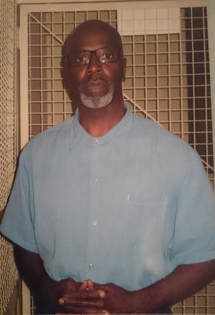 Bio: Steve Champion (Adisa Akanni Kamara) is a death row prisoner at San Quentin State Prison. A Crip emeritus, he grew up in South Central Los Angeles. Champion has been incarcerated since 1981. He is self taught and conversant in African history, philosophy, political science, and comparative religion. As an author he has received an honorary mention in the short fiction category in the 1995 Pen Prison Writing Contest and in 2004 won first place in nonfiction for his essay, “His Spirit Lives On: George E. Marshall.“ In 2010 Steve published a memoir entitled "Dead to Deliverance". Steve continues to write and research for future projects. Steve welcomes correspondence at the address below: Steve Champion C58001 San Quentin State Prison San Quentin CA 94974 10/23/2017 Florida by Jon BergerPhoto - Thomas Hawk
Florida Spring Break Beaches and girls Blah blah blah We partied in a taco bell The Russians started it. They worked an oil rig. The only human beings we met down there. dancing With the employees behind The counter. The cops came More for them than us We ran into the streets and Jumped into a taxi Throwing money at him. The driver took a back alley And seemed to not Like cops as much As us And then side swiped a van Taking off its back bumper It was a great joke We all had a good laugh He kept driving But faster. He was angry but didn’t speak English Pointing at the funny front end of his Taxi, which was smoking. Then We transformed into the only little things we knew Which was that We grew up with guys who got killed in war in a country that he might’ve been from Kicked out by a pier We found a hotel party Full of people with tribal tattoos that wanted to Drull the world Over. Until morning bright domed Like we lit the sun on fire. Over that lesser peninsula On the rippling blue sea Bio: Jon Berger lives in Saginaw, Michigan. His work has appeared in Five 2 One Magazine, Jellyfish Review, The New Engagement, fluland mag, The Bitchin’ Kitsch and Oddball Magazine. 10/23/2017 Poetry by Matt DugganOne Million Tiny Cuts How did you cope with the first tiny cut? the milk that drained from the soul. Did that cut lay inscribed on your back? how did the mechanism work for you. Some never reveal their first tiny cut thin tissue that departed into liquid, shrugged as a learning curve of emotions while other’s build a solid resistance; killing sorrow before it spreads into their blood age will always teach us the value in the cracks that will reappear, as they do not see the one million tiny cuts embellished on your back which strengthens resolve, in a battlefield where you feed on another tiny cut. A Portrait of Park Benches Summer evening in June a square field in short embers long emerald – frozen crow like miniature statue in coal blood trees shake nervous leaves from their bones, falling like bullets shaped as acorns into streams. The only requiem I see these days are the silver and blue plaques etched into the centre of park benches, no place of birth or worship - wasteland in camera and scarlet ruin. Modern Happiness Was Never Supposed to be an Algorithm Under the mask lamp posts in black camera stands eyes powering you to believe in everything they never planned. Similarity makes a city EASY to ply, sugar laced exterior it’s guts and voice a textual clone; When culture saturates repeating stars on a moving racetrack - we are transfixed by our handheld squares a prisoner to our own made – up popularity. Eventually you’ll see the full print of the human condition where happiness has always been kept as a flux of oxygen; A ceramic sky of blue with a vista of two million tears falling beside the whispering moths of wild and dangerous nature, we know now that modern happiness was never supposed to be an algorithm 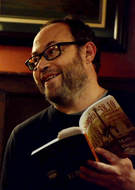 Bio: Poems have appeared in Harbinger Asylum, Anti-Heroin Chic, Osiris, The Journal, Into the Void, Ink, Sweat, and Tears, Carillon, Anapest Journal, Algebra of Owls, Winner of the Erbacce Prize for Poetry in 2015 and Winner of the Into the Void Poetry Prize in 2016. Matt has a new collection of poems being published by New York Publishing House http://www.claresongbirdspub.com called ' One Million Tiny Cuts' now taking pre-orders. 10/22/2017 Poetry by Emily CorwinPhoto - galaxies and hurricanes
tiny catastrophe 1 the murmur hollow in her, she tangled rapturous in the tall, tall garret, entwining in a body glitter, diadem begemmed, the microplastics wash off, proceeding to the ocean’s debris, she says water feels good in me, the payment won’t complete, it buffers, she needs artisanal waters at zero calories, she nearly forgot the prozac after hours, at the craggy room of hers, the salted drenching snarls below. tiny catastrophe 3 sickly, I winnow in the window, mewling for strawberry milk & a poplin button-down with a peter-pan collar & a dried pomander of apple stuck through with cloves. this hot september goes too achingly, like a ragged something slinking into the underwood, into the streamlet nearly died out. smite, smitten, I spangle myself with cold gold lockets & holographic sling- back heels. I know you won’t come around any time soon, I complain too much, hog the red blend bottle to myself. tiny catastrophe 5 she is so very achey lately, she orders an expensive room for sleeping in, the zero money that she has—it goes to hand- milk & complexion sponges, plum seed oil, a glass-dazzle lippie, a grosgrain ribbon barrette, she downs a claret, her cheek-dew blushes rubescent, stinging for a dip in the streambed. tiny catastrophe 6 why would I want to murder in my rapid eye movement sleeping, why lacerate the cat with a box cutter, why put my love in a pillbox hat box, removing the lid to inspect him as his eye befallen & calm, why hurt, why the red impulse to put an end to moving objects, the mouth-watering dagger & musket in my glottis. myself as a pinprick in a bucket of wool, I am a big weepy idiot & there you are gloriously typical, I am loving you all wrong, always cellular calling you, in all ways from a pinch-dark hill, no firewood for acres, for stretches of america I have not itched. Bio: Emily Corwin is a Midwestern girl who loves all things pretty. She is currently an MFA candidate in poetry at Indiana University-Bloomington. Her writing has appeared or is forthcoming in Winter Tangerine, glitterMOB, Hobart, smoking glue gun, and Word Riot. |
AuthorWrite something about yourself. No need to be fancy, just an overview. Archives
April 2024
Categories |
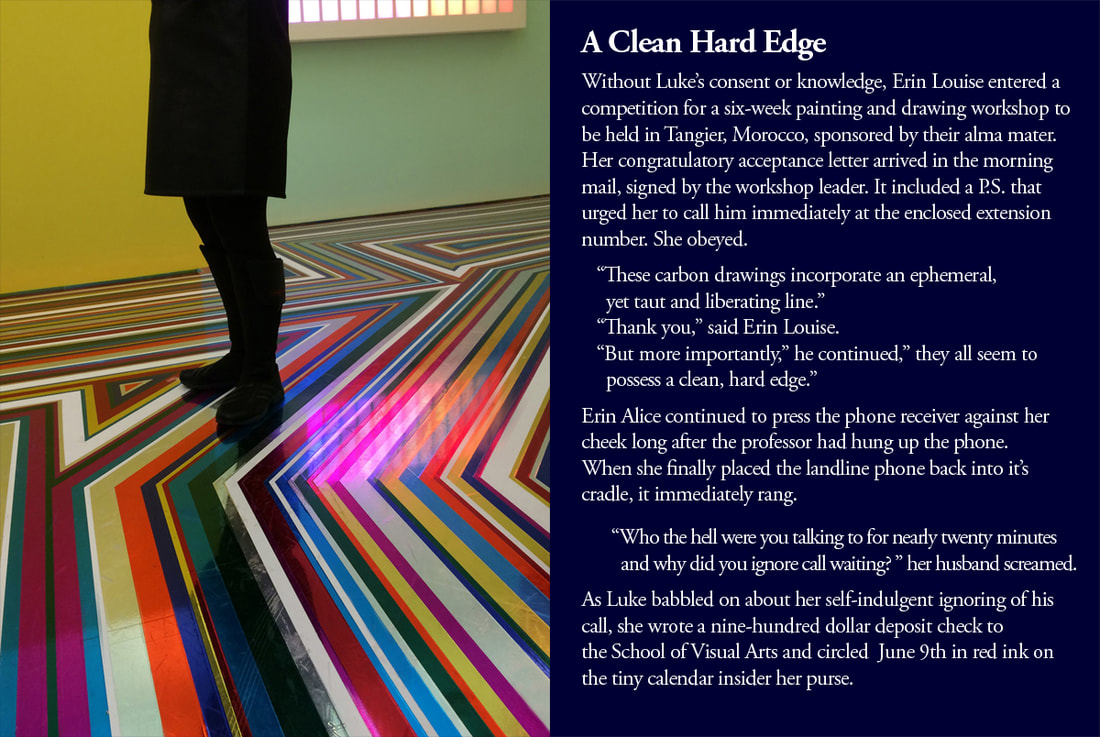
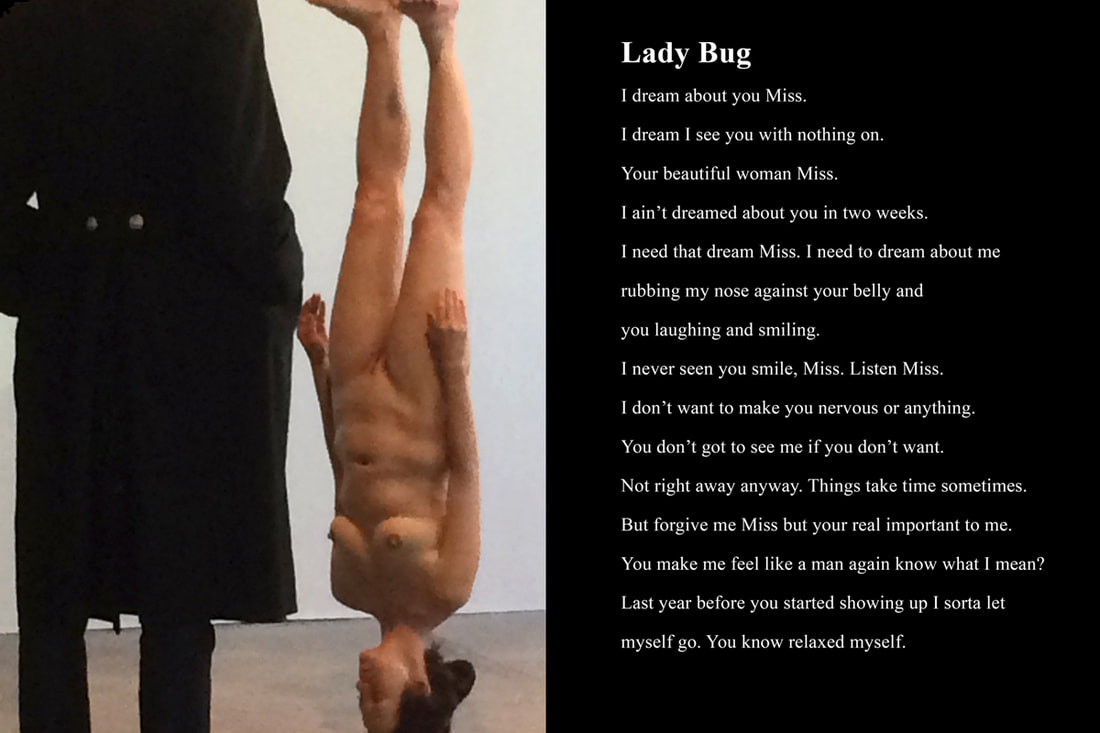
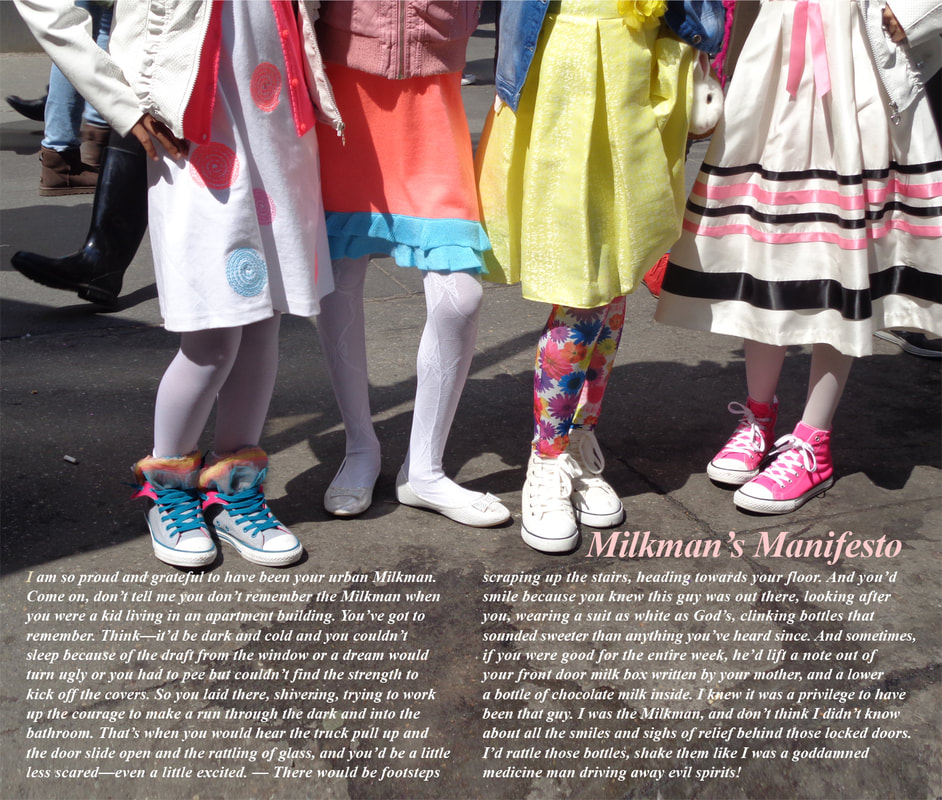
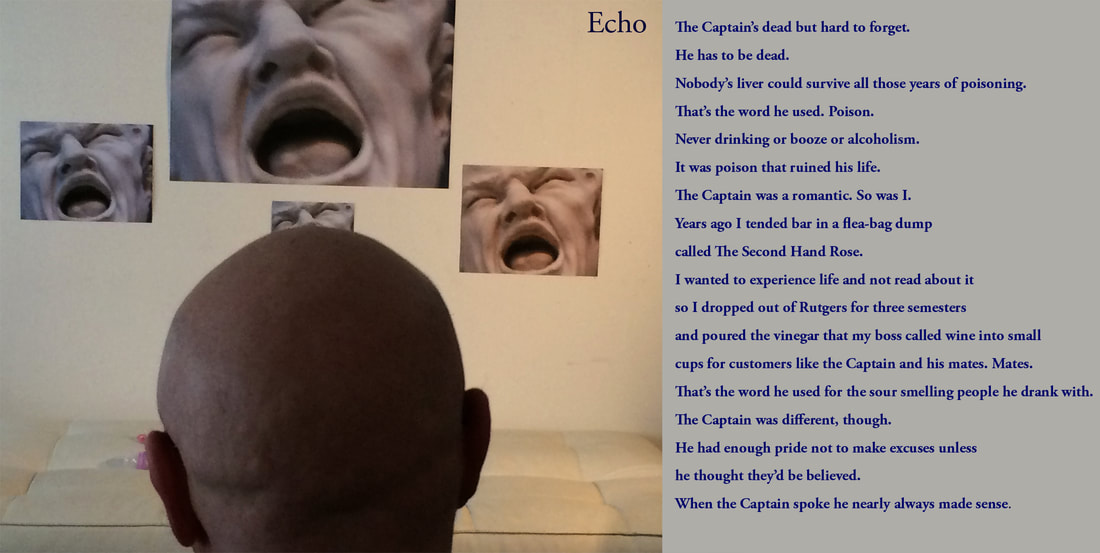
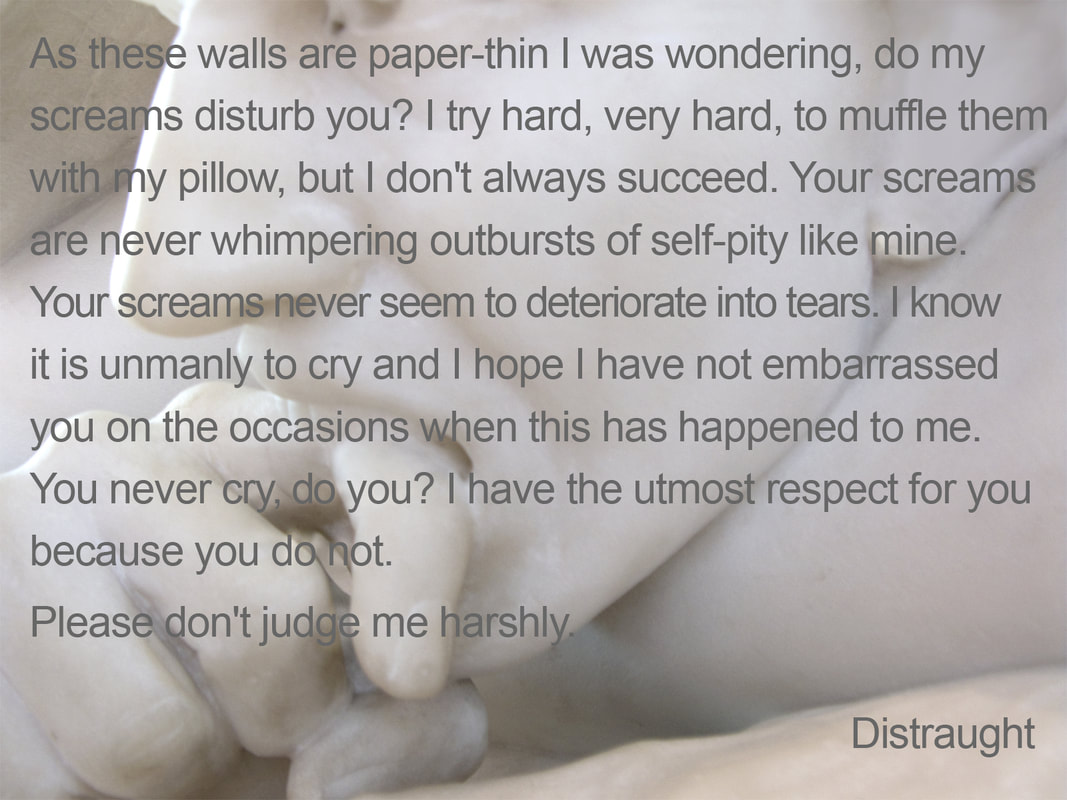
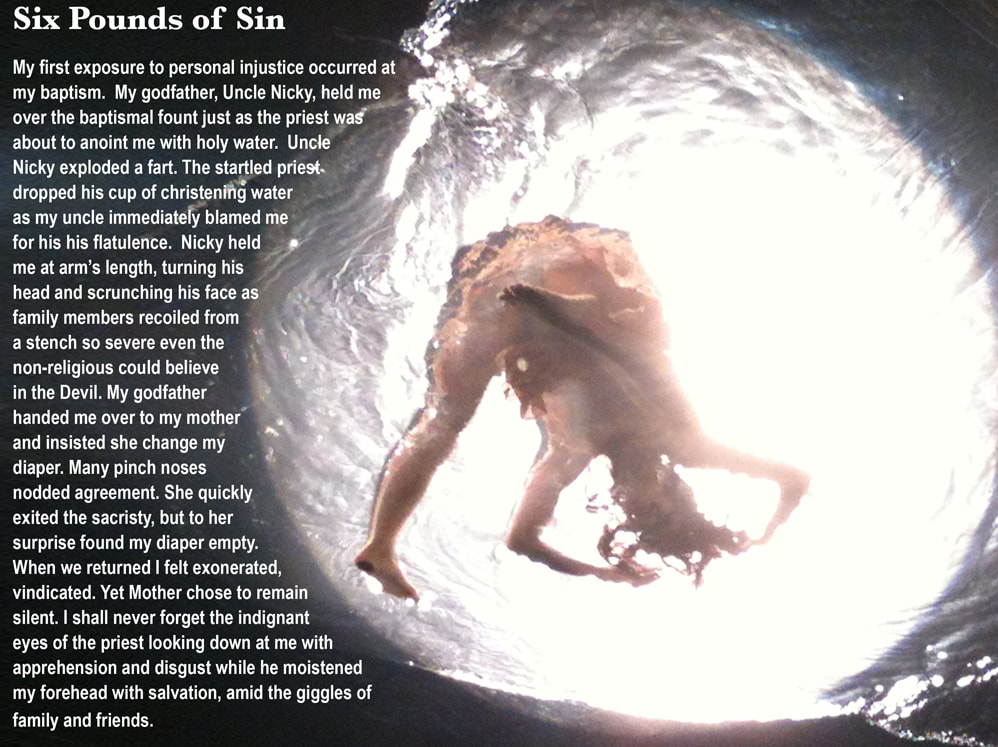
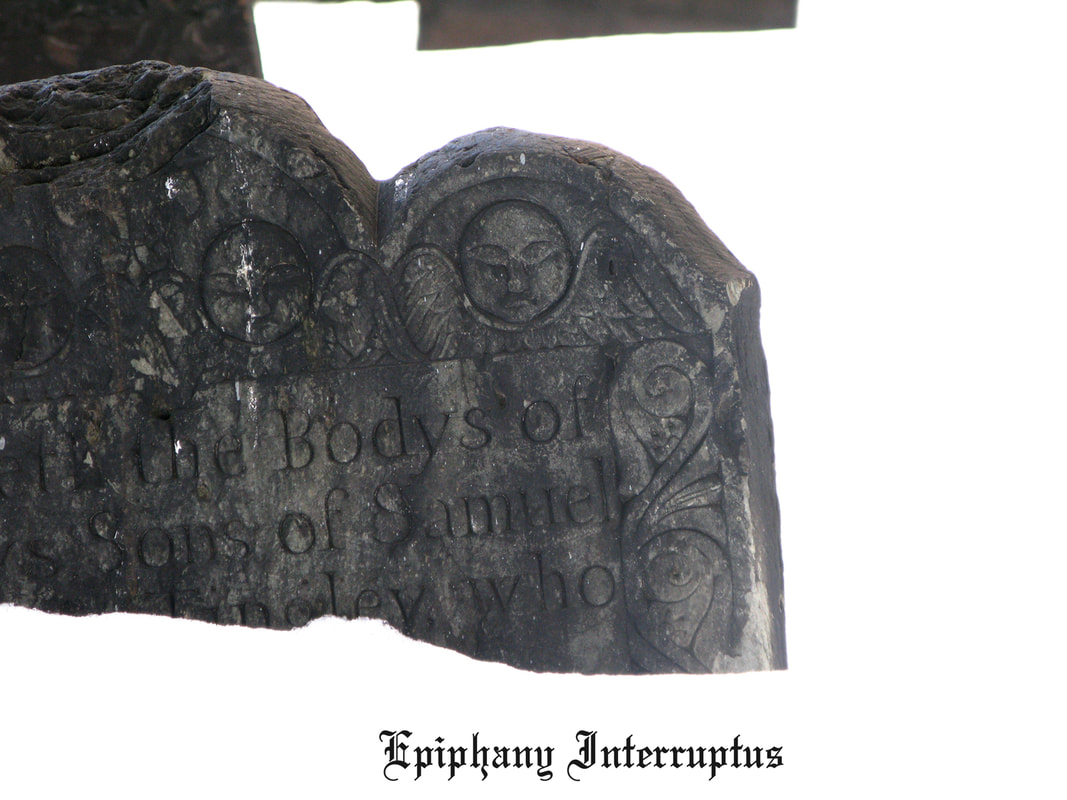
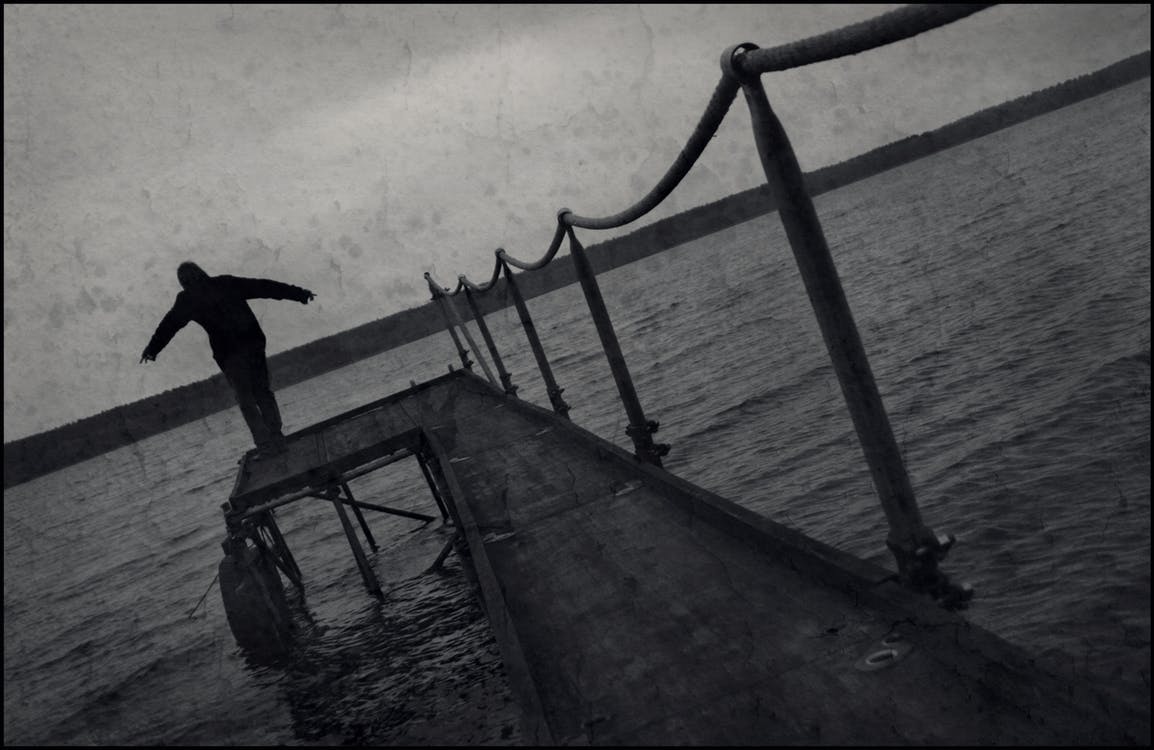
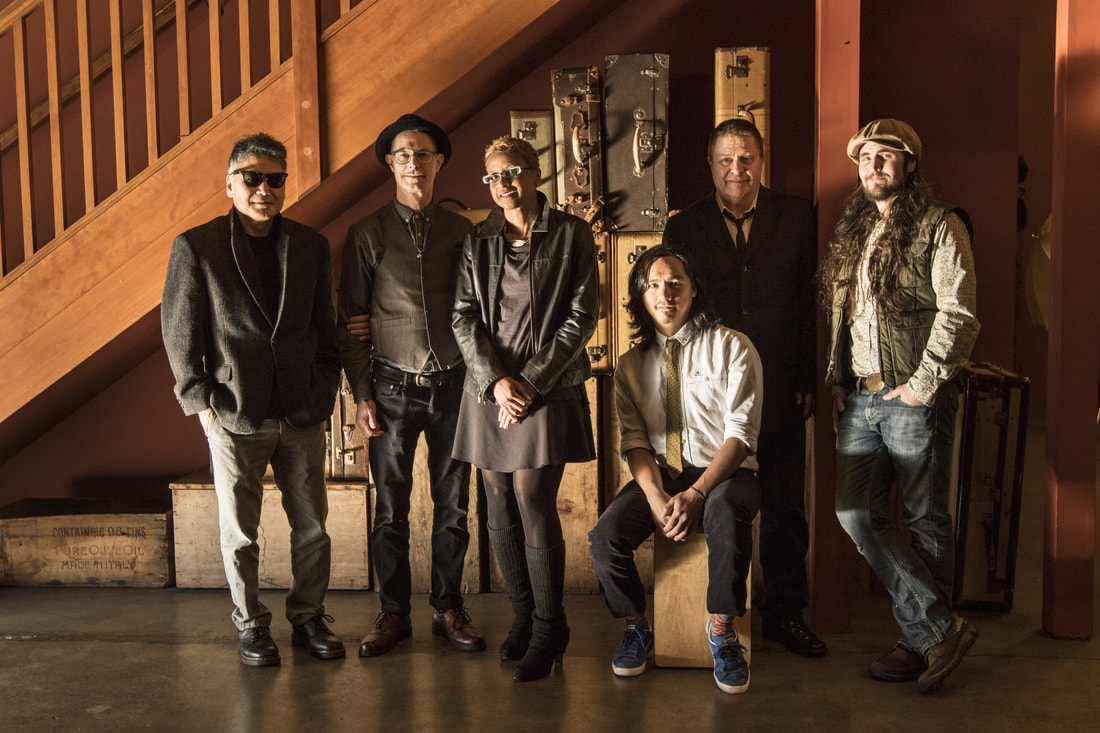
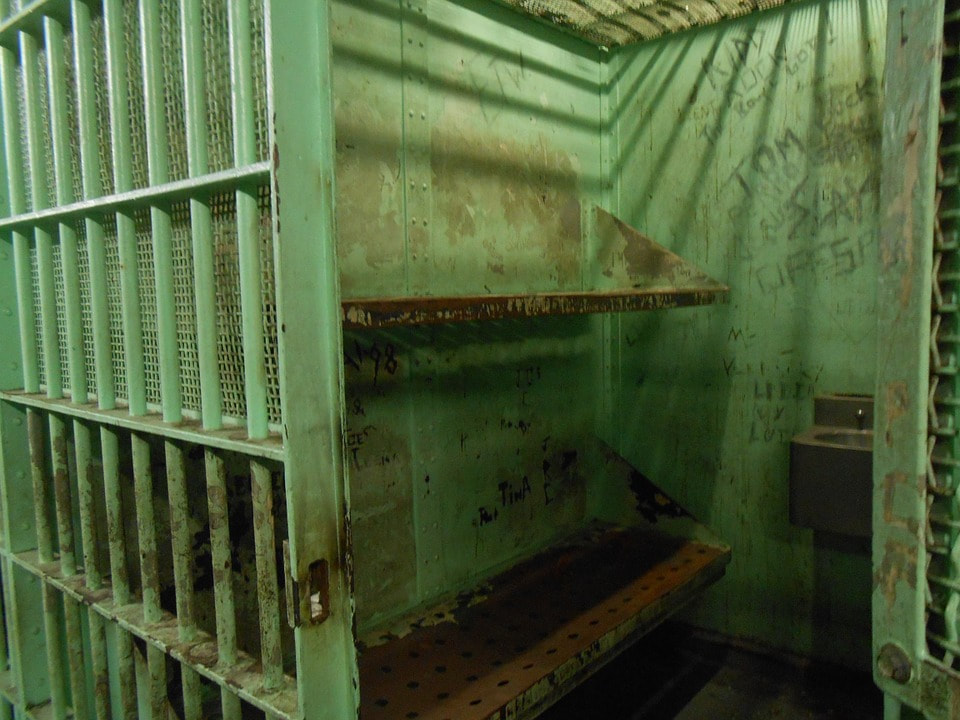




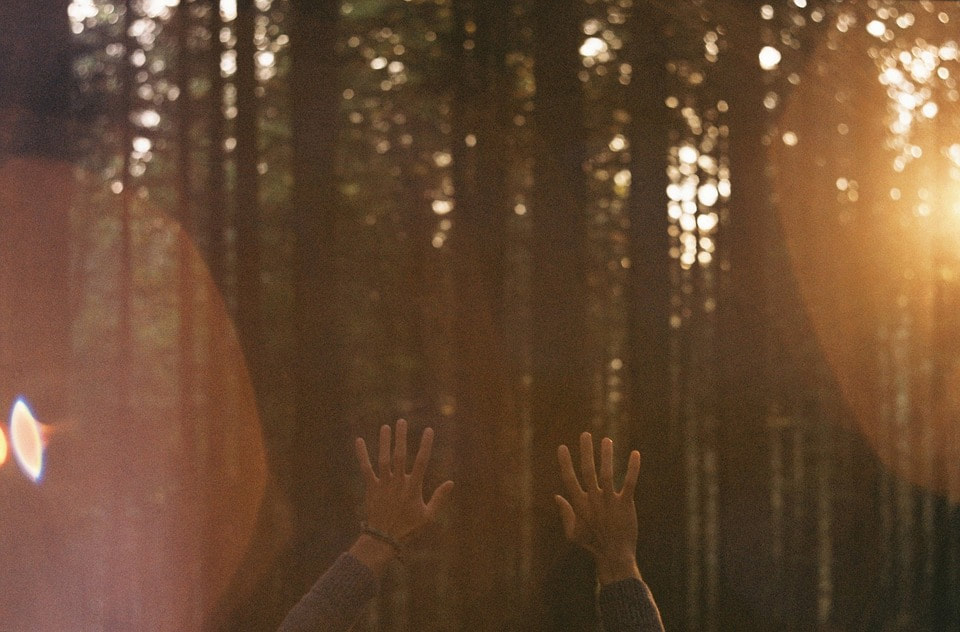
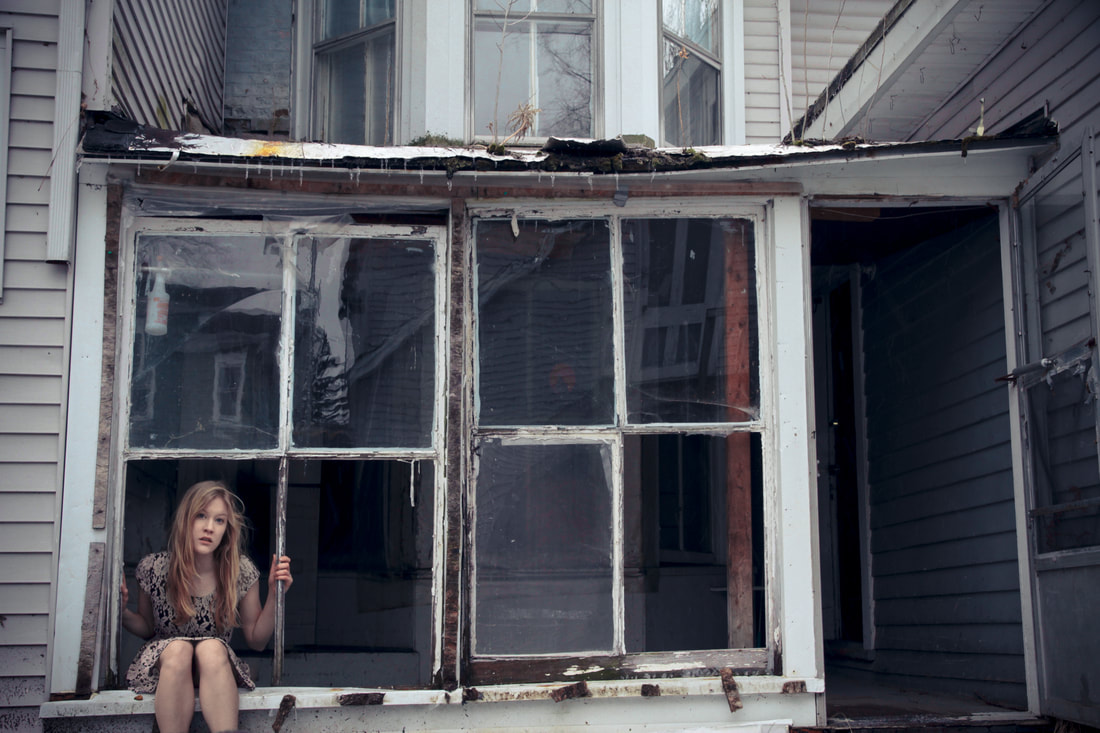
 RSS Feed
RSS Feed
